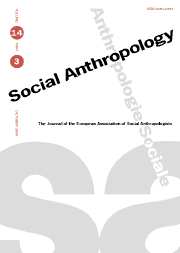The field of work and the work of the field: Conceptualising an anthropological research engagement
Published online by Cambridge University Press: 10 July 2006
Abstract
This article aims to examine our positioning process as ethnographers in the field. Drawing on my fieldwork in Israel among non-Jewish undocumented migrants who initially were extremely reluctant to cooperate with my research, I highlight the power of informants to largely dictate the conditions for an engagement with an anthropologist, and define the parameters of proximity. This power of informants, or more generally of the ‘field’, brings to the fore the existing tension between our strategic design of methods and their tactical implementation during fieldwork. By applying Bourdieu's conceptualisation of a ‘field’, I seek to emphasize both the relational configuration and habitus of actors, as generative elements that shape our interactions and position in the field. I particularly focus on our ingrained dispositions that can sometimes significantly direct our tactical management of crucial situations in the field, and shape our sense of ethics. Echoing Marcus (1995) and following Bourdieu's insights, I finally suggest that we should try to exercise self-reflexivity as an element of method before and throughout our fieldwork, rather than use it retrospectively to account for our distinctive involvement and the ways it might have impacted our informants and collected data.
Cet article a pour but d'examiner la façon dont les ethnographes se positionnent sur le terrain. En m'appuyant sur une recherche en Israël avec des migrants non Juifs et sans papiers qui étaient au début très hésitants à m'apporter leur coopération, je souligne le pouvoir qu'ont les informateurs de dicter en grande partie les conditions d'un engagement avec un anthropologue et de définir les paramètres de la proximité. Ce pouvoir des informateurs, et plus généralement ce pouvoir du [Lt ]terrain[Gt ], met en lumière la tension entre notre stratégie méthodologique et son application pendant le terrain. En appliquant le concept bourdieusien de [Lt ]champ[Gt ], je cherche à souligner à la fois la configuration relationnelle et l'habitus des acteurs comme générateurs d'éléments qui façonnent nos interactions et notre positionnement sur le terrain. Je me concentre en particulier sur nos dispositions propres qui peuvent parfois influer de manière significative sur notre gestion tactique d'une situation difficile sur le terrain, et qui façonne aussi notre sens de l'éthique. En rappelant Marcuse (1995) et en suivant les éclairages de Bourdieu, je suggère enfin que le retour sur soi devrait constituer un élément de méthode avant et pendant le travail de terrain, plutôt que de l'utiliser de manière rétrospective pour rendre compte des caractéristiques de notre participation et de la façon dont elle a influé sur nos informateurs et sur les données recueillies.
Dieser Artikel umfasst eine Betrachtung unserer Positionierung als Ethnographen im Feld. Ich lege Nachdruck auf die Macht der Informanten, die Bedingungen, unter denen sie bereit sind, sich mit einem Anthropologen auseinanderzusetzen, zum größten Teil zu diktieren und den Abstand zum Forscher selbst zu bestimmen. Dabei greife ich auf meine Feldforschung unter nicht-jüdischen, undokumentierten Einwanderern in Israel, welche anfangs in ihrer Teilnahme an meinem Forschungsprojekt äußert zurückhaltend waren, zurück. Diese Macht der Informanten, oder allgemeiner ausgedrückt des, Feldes', kehrt die bestehende Spannung zwischen unserem strategischen Methodenentwurf und dessen taktischem Einsatz in der Feldforschung hervor. Mit der Anwendung Bourdieus Konzeptualisierung eines, Feldes' strebe ich danach, die Beziehungskonfigurationen als auch den Habitus der Handelnden als formende Elemente hervorzuheben, welche unsere Interaktionen sowie auch unsere Positionen innerhalb des Feldes bestimmen. Insbesondere widme ich mich unseren uns eingefleischten Dispositionen, welche bisweilen unser taktisches Management kritischer Situationen im Feld bezeichnend mitbestimmen und überdies unser ethisches Empfinden prägen. Im Schatten von Marcus (1995) und in der Nachfolge Bourdieus Erkenntnissen, fordere ich schließlich zum Versuch auf, Autoreflexivität als methodologischen Aspekt vor und während der gesamten Feldforschung zu üben, anstatt sie rückblickend einzusetzen, um unseren spezifischen Einsatz im Feld zu rechtfertigen und die dadurch mögliche Beeinflussung unserer Informanten und folglich der von uns gesammelten Daten zu kontextualsieren.
En este artículo se propone examinar nuestro proceso de posicionamiento como etnógrafos dentro del campo. Con base en mi trabajo de campo en Israel con migrantes indocumentados no judíos quienes en principio rechazaron cooperar para mi investigación, recalco el poder de los informantes para dictar por la mayor parte su participación con un antropólogo, y definir los parámetros de proximidad. Este poder de los informantes, o más genéricamente del ‘campo’, trae a colación la tensión existente entre nuestro diseño estratégico de métodos y su implementación táctica durante el trabajo de campo. Al aplicar el marco conceptual de Bourdieu sobre el ‘campo’, intento enfatizar tanto la configuración relacional como el habitus de los actores, como elementos generadores que conforman nuestras interacciones y posición en el campo. Me enfoco particularmente en nuestros enraizados prejuicios, que algunas veces pueden significativamente influir nuestro manejo táctico de situaciones cruciales en el campo, y definir nuestro sentido ético. Refiriéndome a Marcus (1995) y siguiendo las ideas de Bourdieu, finamente sugiero que deberíamos intentar un ejercicio de auto-reflexión como elemento metodológico antes y durante nuestro trabajo de campo, y no solo retrospectivamente para probar nuestros hallazgos, y las maneras en que se pueden haber influido nuestros informantes o información recolectada.
- Type
- Younger Scholars's Forum
- Information
- Copyright
- © Cambridge University Press 2006
Footnotes
- 1
- Cited by




